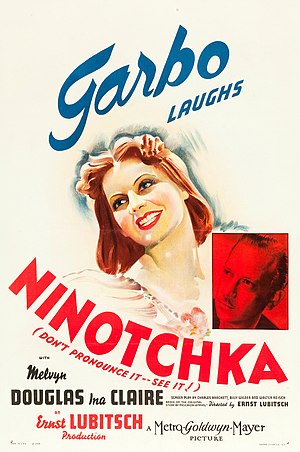Ninotchka
Jump to navigation
Jump to search
| Ninotchka | ||||||||||||||||||||||||
|---|---|---|---|---|---|---|---|---|---|---|---|---|---|---|---|---|---|---|---|---|---|---|---|---|
This film has been preserved in the National Film Registry in 1990.
| ||||||||||||||||||||||||
 | ||||||||||||||||||||||||
|
Ninotchka is a 1939 American comedy film made for Metro-Goldwyn-Mayer by producer and director Ernst Lubitsch and starring Greta Garbo and Melvyn Douglas. It was written by Billy Wilder, Charles Brackett, and Walter Reisch, based on a screen story by Melchior Lengyel. Ninotchka is Greta Garbo's first full comedy, and her penultimate (second-to-last) film.
Why It Rocks
- Since her arrival at the studio in 1925, Greta Garbo had been one of the studio's most important, and protected stars. Garbo was a critics' favorite while remaining something of a mystery to mass audiences. Like the best movie stars, her face remained something of an immobile mask, impossible to read with certainty. But she was branded “box office poison” when her work couldn’t find sizable audiences. Ninotchka serves as an attempt to"humanize" Garbo, or at least bring her down to the level of Americans.
- Screenwriters Brackett and Wilder's biggest contribution -- aside from their typically biting jokes -- was to shape the film as a Cinderella tale and develop the roles of the three low-level Russian envoys. Similar to Dorothy Gale's trio of companions, the envoys here would bring the titular Ninotchka to Paris, introduce her to a French lover, and arrange for the story's happy ending.
- The film's full of consistently marvelous dialogue, again provided by Brackett and Wilder. Even the throwaway lines are impressive.
- Some bits played out in front of and behind a hotel room door evoke Trouble in Paradise. But for the most part, Lubitsch remains discreet, giving the actors plenty of room, letting the story unfold at an unforced pace, using an unobtrusive camera and quiet fades to punctuate scenes. His greatest trick may have been successfully portraying Garbo as earthier than her romantic rival Ina Claire, playing a Grand Duchess.
- Reviewers appreciated Garbo's willingness to spoof her screen persona, especially the robotic monotone she uses in her opening scenes. Garbo plays the titular Ninotchka as an utter naïf, and her bewilderment at the consumer charms of Paris, her consternation at how easily her comrades are corrupted, and her gradual thawing in the face of love show how accomplished a performer she was.
Bad Qualities
- While Greta Garbo's scenes as a naïf and mellowing down are very memorable, her more romantic scenes, where she wears ill-advised evening gowns and succumbs to Melvin Douglas' wooing aren't nearly as enjoyable.